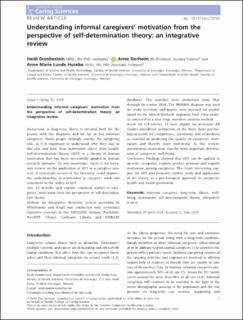| dc.contributor.author | Dombestein, Heidi Janne | |
| dc.contributor.author | Norheim, Anne | |
| dc.contributor.author | Husebø, Anne Marie Lunde | |
| dc.date.accessioned | 2023-02-01T13:40:49Z | |
| dc.date.available | 2023-02-01T13:40:49Z | |
| dc.date.created | 2019-08-27T13:44:12Z | |
| dc.date.issued | 2019 | |
| dc.identifier.citation | Dombestein, H., Norheim, A., & Lunde Husebø, A. M. (2020). Understanding informal caregivers' motivation from the perspective of self‐determination theory: An integrative review. Scandinavian journal of caring sciences, 34(2), 267-279. | en_US |
| dc.identifier.issn | 0283-9318 | |
| dc.identifier.uri | https://hdl.handle.net/11250/3047765 | |
| dc.description.abstract | Background
A long-term illness is stressful both for the person with the diagnosis and for his or her informal caregivers. Many people willingly assume the caregiving role, so it is important to understand why they stay in this role and how their motivation affects their health. Self-determination theory (SDT) is a theory of human motivation that has been successfully applied in human research domains. To our knowledge, there is no literature review on the application of SDT in a caregiver context. A systematic review of the literature could improve the understanding of motivation in caregiver work and contribute to the utility of SDT.
Aim
To describe and explore empirical studies of caregivers' motivation from the perspective of self-determination theory.
Methods
An integrative literature review according to Whittemore and Knafl was conducted with systematic repetitive searches in the MEDLINE, Scopus, PsychInfo, PsycNET, Chinal, Cochrane Library and EMBASE databases. The searches were performed from May through December 2018. The PRISMA diagram was used for study selection, and papers were assessed for quality based on the Mixed Methods Appraisal Tool. Data analysis consisted of a four-stage narrative analysis method.
Result
Of 159 articles, 10 were eligible for inclusion. All studies considered satisfaction of the three basic psychological needs for competence, autonomy and relatedness as essential in predicting the quality of caregivers' motivation and thereby their well-being. In this review, autonomous motivation was the most important determinant of caregivers' well-being.
Conclusions
Findings showed that SDT can be applied to identify, categorise, explain, predict, promote and support motivation among caregivers. This lends interesting support for SDT and promotes further study and application of the theory as a psychological approach to caregivers' health and health promotion. | en_US |
| dc.language.iso | eng | en_US |
| dc.publisher | Wiley | en_US |
| dc.rights | Navngivelse 4.0 Internasjonal | * |
| dc.rights.uri | http://creativecommons.org/licenses/by/4.0/deed.no | * |
| dc.title | Understanding informal caregivers' motivation from the perspective of self-determination theory: an integrative review | en_US |
| dc.type | Peer reviewed | en_US |
| dc.type | Journal article | en_US |
| dc.description.version | publishedVersion | en_US |
| dc.rights.holder | The authors | en_US |
| dc.subject.nsi | VDP::Medisinske Fag: 700 | en_US |
| dc.source.pagenumber | 1-13 | en_US |
| dc.source.journal | Scandinavian Journal of Caring Sciences | en_US |
| dc.identifier.doi | 10.1111/scs.12735 | |
| dc.identifier.cristin | 1719150 | |
| dc.relation.project | Universitetet i Stavanger: IN-12707 | en_US |
| cristin.ispublished | true | |
| cristin.fulltext | original | |
| cristin.qualitycode | 1 | |

